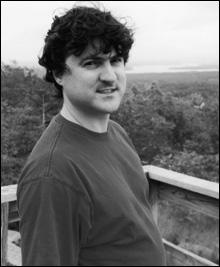
Beach Boy book: Mike Heppner on Brian Wilson.
|
Public nudity, a desolate parking lot in the wilderness, and . . . the Beach Boys? In Watertown native Mike Heppner’s novel Pike’s Folly, these elements conspire in the background of a story about guilty pleasures and the folks who try and hide them. Pike’s Folly is the tale of Rhode Island millionaire Nathaniel Pike, who builds massive industrial projects seemingly devoid of any practical purpose — like erecting a K-Mart in the White Mountains. And Pike’s supporting cast is just as nutty — including his daughter’s boyfriend, who’s a struggling indie filmmaker, and Pike’s assistant, Stuart, a frustrated writer whose wife is struggling with the urge to be naked … in public.
And, of course, there’s Brian Wilson. When Heppner needed a “spiritual guide” for Pike’s Folly, he created a fictionalized version of the Beach Boys’ creative genius. With summer coming on strong, Heppner sat down with the Phoenix discussed the inspirations behind the book: Providence, prog-rock, and the Beach Boys’ lost masterpiece Smile.
BRIAN KING: Being a huge Beach Boys fan myself, I really enjoyed reading Brian Wilson as a character in Pike’s Folly.
MIKE HEPPNER: Well, thank you. For a while, I had to build up an impression of him while writing his lines. One thing I did was when he spoke in gerunds, I apostrophized them. So “hanging out” would be ‘hangin’ out.’ And it made his voice different from all the others in the book. I didn’t want him to seem too weird and I wanted to do right by him. He has trouble communicating sometimes and it wouldn’t be fair to turn him into a raving visionary or something.
BK: Why Brian Wilson?
MH: I guess the book needed a spiritual guide. I’m not sure why I felt that, but I wanted someone who stood aside from the story who offered wisdom and inspiration. There are always artists that inspire me at a certain time, and at that time it was him. And I’ve always admired artists where there is a push-pull dynamic between their instincts to be commercial and popular, while their mind is warped to what the mainstream really is. And that was Brian Wilson, particularly around the time of Smile [the Beach Boys’ 1967 “lost” masterpiece, rerecorded and released by Wilson in 2004]. He was going through a war inside himself, which spun out of control. He wanted to make popular music that spoke to adults and children while still being intellectual. I can relate to that because in the books I write, I try to be entertaining. But at the same time, my sense of what’s entertaining is a little off and it comes off a little strange, like Smile.
BK: So Smile, in particular, was a big inspiration on Pike’s Folly?
MH: A lot of ideas came together through instinct. I had a lot of ideas for the book and most of them went away. But the ideas that stuck . . . I kept going back to Brian Wilson. And for a while, the whole book was structurally modeled after Smile. Each chapter was named after a song. But when the album was finally [re-]released it made me rethink that idea because the novelty had been lost a little bit, so I toned it down.
BK: Are the Beach Boys are your favorite band?
MH: Probably not, but I have so many favorite bands. When I was a kid I was an amateur musician and so I listened to music that was rhythmically challenging like Yes, King Crimson, and old Genesis. I learned to play like [Yes drummer] Bill Bruford. I’ve always loved Brian Eno too. Eno and guys like Brian Wilson and Todd Rundgren and are alike in that commercially avant-garde style.
BK: When did you first realize how good the Beach Boys were?
MH: Well, when I first heard Pet Sounds, it surprised me how not rock it is, but since my tastes were mostly prog-rock, I liked it, but I didn’t get into it. But in my mid-20s, where I was having a hard time leaving college and figuring out what to do, Pet Sounds spoke to me in that Who-am-I?, Who-am-I-going-to-be? way. And songs like “That’s Not Me” really spoke to me. And through that, I appreciated how deep and layered the Beach Boys’ music was, which led me to their later albums. It also got me over my hang-up of thinking they were just cheesy surf music. I always hate people who find the most obscure thing about an artist and say, “that’s the best,” but with the Beach Boys, it’s true. Even in the early stuff, lesser known songs like “Don’t Back Down” and “Girls On The Beach” are more interesting than “Surfin’ USA.”